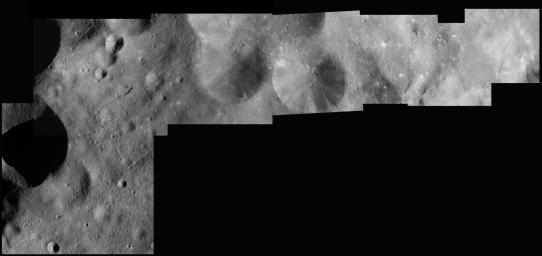
|
Peering at Phoebe
- Click the image above for a larger view
- Full-Res JPEG (7426 x 3509) (1.3 MB)
- Full-Res TIFF (7426 x 3509) (10.6 MB)
Caption:
Shown here is a mosaic of seven of the sharpest, highest resolution images taken of Phoebe during Cassini's close flyby of the tiny moon. The image scales range from 27 to 13 meters (90 to 43 feet) per pixel. Smaller and smaller craters can be resolved as resolution increases from left to right. The number of blocks, or bumps on the surface also increases to the right. The Sun is coming from the right, so the bright-dark pattern is reversed between blocks and small craters. Grooves or chains of pits are seen on the left portion of the mosaic, which may mark fractures or faults induced by large impact events. Many of the small craters have bright rays, similar to recent craters on the Moon. There are also bright streaks on steep slopes, perhaps where loose material slid downhill during the seismic shaking of impact events. There are also places where especially dark materials are present, perhaps rich in carbon compounds.
Background Info:
The Cassini-Huygens mission is a cooperative project of NASA, the European Space Agency and the Italian Space Agency. The Jet Propulsion Laboratory, a division of the California Institute of Technology in Pasadena, manages the Cassini-Huygens mission for NASA's Office of Space Science, Washington, D.C. The Cassini orbiter and its two onboard cameras, were designed, developed and assembled at JPL. The imaging team is based at the Space Science Institute, Boulder, Colo.
For more information, about the Cassini-Huygens mission visit, http://saturn.jpl.nasa.gov and the Cassini imaging team home page, http://ciclops.org .
Cataloging Keywords:
| Name | Value | Additional Values |
|---|---|---|
| Target | Phoebe | |
| System | Saturn | |
| Target Type | Satellite | |
| Mission | Cassini-Huygens | |
| Instrument Host | Cassini Orbiter | |
| Host Type | Orbiter | |
| Instrument | Imaging Science Subsystem (ISS) | |
| Detector | ||
| Extra Keywords | Crater, Grayscale, Impact, Moon | |
| Acquisition Date | ||
| Release Date | 2004-06-14 | |
| Date in Caption | ||
| Image Credit | NASA/JPL/Malin Space Science Systems | |
| Source | photojournal.jpl.nasa.gov/catalog/PIA06072 | |
| Identifier | PIA06072 | |
